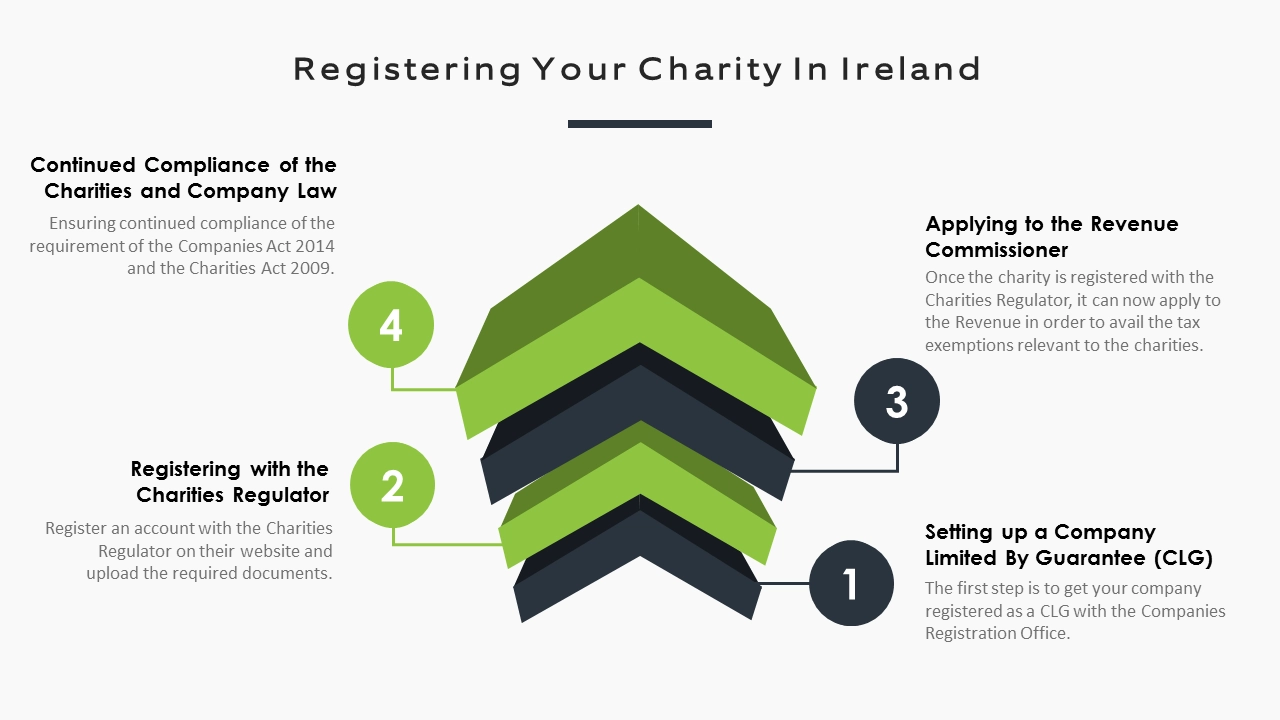
Charitable organizations
 30 Jun, 2023
30 Jun, 2023
ESSENTIALS OF APPLYING FOR CHARITABLE STATUS FOR YOUR ORGANISATION
Are you looking to establish your organisation in Ireland as a Registered Charity? There are several benefits to doing so. It not only endorses the organisation’s commitment to serving the community while demonstrating adherence to high standards of administration and governance but also adds to its credibility and trustworthiness. This guide explains the key concerns that you need to address before going ahead with applying for Charitable Status and what are the benefits of doing so.
All the charities in Ireland are required to be registered with the Charities Regulator. Let us first look at some of the requisite questions you need to answer before applying for the registration process.
Questions to Consider Before Applying for the Charitable Status
You should apply for the Charitable Status and become a Registered Charity to operate in Ireland if the answer to the following three questions is a ‘Yes’.
⦁ Does your organization wish to operate in Ireland to carry out charitable activities?
⦁ Is your organization looking to carry out charitable purposes exclusively?
⦁ Whether your organization works for a public benefit?
Understanding What a Charitable Purpose Is?
Some examples of charitable purposes include activities targeted at poverty alleviation, advancing education, or religion. It also consists of any other purpose carried out for the benefit of the public, such as promoting civil responsibility, protecting the natural environment, promoting art, heritage, and culture, or promoting health, including the prevention of sickness.
What Conditions Must be Met When Applying for Charitable Status?
In contrast to a Company Limited by Guarantee (CLG) that does not carry out charitable activities, a CLG aiming to apply for charitable status must have the following requirements met:
⦁ Drafting the Objects Clause – The charity’s board of trustees should draft the objects clause specifying its purpose of establishment and how this will be achieved, who will benefit from the charity’s work and its location of operation.
⦁ Number of Trustees – Just as the directors in any other company, the directors of the CLG operating a charity act as the charity’s trustees and are entrusted with the duties of control and management of the charity. For your organisation to register as a charity, it must have a minimum of three unrelated trustees as required by the Charities Regulator.
⦁ Number of Members – There is no maximum limit for the number of members. However, the Revenue Commissioner requires the CLG operating as a charity to have three members.
Requirements to be Fulfilled When Applying to the Charities Regulator
It’s essential to be aware that the charity and its trustees will be subject to the regulations of the Charities Act, 2009 after being registered with the Charities Regulator. There are legal obligations for the trustees that should be considered with priority.
We help our clients from the onset, ensuring everything is carried out in a legally compliant manner. First, explain the requirements you must know when registering for charitable status.

⦁ Setting up a CLG – Using our company formation packages, you can easily set up a CLG. We ensure that the Constitution document for your company is drafted in pursuance of the requirements of the Charities Regulator.
⦁ Registering with the Charities Regulator – While your company is registered with the Companies Registration Office (CRO), register an account with the Charities Regulator on their website. Certain documents are required to be uploaded along with the application. These documents include the Constitution document, details of the trustees and their declaration forms, a detailed business plan with projected cashflows and the conflict of interest policy.
⦁ Applying to the Revenue – Once the charity is registered with the Charities Regulator, it can now apply to the Revenue to avail the tax exemptions relevant to the charities. Also, where staff the charity employs staffing will make the necessary deductions from the employee’s salary under the PAYE system.
⦁ Continued Compliance of the Charities and Company Law – Once registered and running, it is important to adhere to the requirements of the Companies Act 2014 and the Charities Act 2009. The CLG needs to meet its filing requirements, for instance, in pursuance of its obligations for the submissions to the CRO. Similarly, the Charities Act 2009 imposes several requirements. The directors of the CLG (trustees of the charity) assume dual responsibilities and should ensure that the operations are run with absolute transparency. One such requirement is submitting the accounts for each financial year to the Charities Regulator.
Benefits of Operating as a Registered Charity
Registering your charity with the Charities Regulator brings added advantages for your organization including the following:
⦁ Affirms your commitment to being transparent and staying compliant;
⦁ Enhances your reliability by providing a strong basis for the volunteers and donors to support the cause of the organisation;
⦁ Enables you to apply to the Revenue for tax exemption status and other benefits; and
⦁ Supports in attracting and retaining funding and securing contracts.
While you embark on your journey to making a difference for the community, we are here to make a difference in the formation process of your Irish charitable organization. So call us to discuss your queries and get off to a professional start.
get a quick quote
Post Category
- Banking (1)
- Company Formation (3)
- Guides (6)
- Uncategorized (28)

